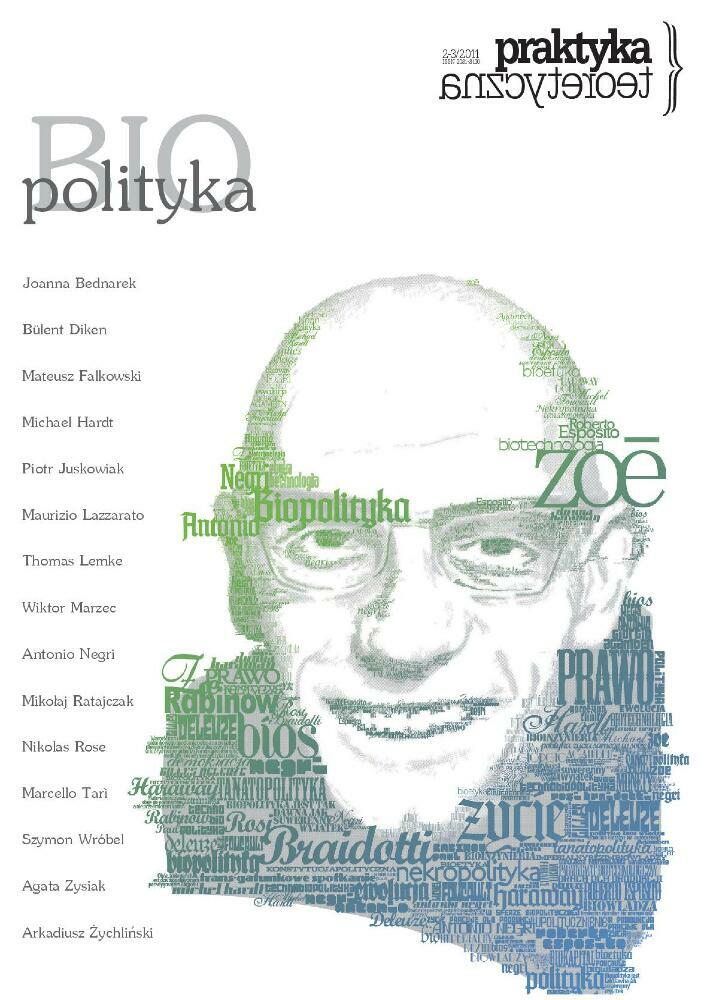Abstract
Infantia, or immaturity, is one of the cha-
racteristic “postmodern maladies”. Such a diagnose
becomes easier to comprehend if one considers an essen-
tial change: while from Michel Foucalt’s perspective the
classical biopolitics comes down to biopower, exercised
over societies in order to instrumentalize them as “pro-
duction machines”, from Bernard Stiegler’s point of
view biopolitics has been replaced these days in Western
societies with psychopower, instrumentalizing com-
munities as “consuming machines”. ~e aim of my
paper is to reconstruct the main forms of the realization
and the consequences of that postmodern psychopower
and to outline ways to counteract it.
References
Agamben G. 2008. Homo sacer: suwerenna władza i nagie życie. Warszawa: Prószyński i S-ka.
Attali J. 1998. Dictionnaire du XXI-e siecle. Paris.
Bauman Z. 2006. Społeczeństwo w stanie oblężenia. Warszawa: Sic!.
Bourdieu P. 2009. O telewizji. Panowanie dziennikarstwa. Warszawa: Wydawnictwo Naukowe PWN.
Cataluccio F. M. 2006. Niedojrzałość. Choroba naszych czasów. Kraków: Znak.
Christakis D., F. J. Zimmerman, D. L. DiGiuseppe, C. A. McCarty. 2004. “Early Television Exposure and Subsequent Attentional Problems in Children”. Pediatrics 113 (4) : 708-713.
Condy J. 1993. “Thief of Time. Unfaithful Servant: Television and the American Child”. Dadalus 122 (1) : 259-278.
Deleuze G. 2007. Postscriptum o społeczeństwie kontroli. W Negocjacje: 1972-1990. Wrocław: Wydawnictwo Naukowe Dolnośląskiej Szkoły Wyższej Edukacji TWP.
Foucault M. 2000. Historia seksualności. Warszawa: Słowo/obraz terytoria.
Gasmi N., Grolleau G. 2002. “Economie de l’information versus economie de l’attention? Une application aux labels agroalimentaires”. Systemes agroalimentaires localisés 16-18.
Greenfield S. 2004. Tomorrow’s People. How 21st-Century Technology Is Changing the Way We think And Feel. London: Penguin.
Kant I. 2008. Beantwortung der Frage: Was ist Aufklarung?. W Zum ewigen Frieden und andere Schriften. Frankfurt/M..
Kundera M. 1997. Powolność. Warszawa: W.A.B..
Kundera M. 2001. Księga śmiechu i zapomnienia. Warszawa: W.A.B..
Lem S. 2004. Sex Wars. Kraków: Agora SA.
Sartori G. 2007. Homo Videns. Telewizja i postmyślenie. Warszawa: Wydawnictwo Uniwersytetu Warszawskiego.
Sloterdijk P. 2008. „Reguły dla ludzkiego zwierzyńca. Odpowiedź na Heideggera list o humanizmie”. Przegląd Kulturoznawczy 4 : 40-62.
Sloterdijk P. 2009. Du must dein Leben andern. Uber Anthropotechnik. Frankfurt/M.
Steiner G. 2007. Meine ungeschriebenen Bucher. München.
Stiegler B. 2008. La telecratie contre la democratie. Lettre ouverte aux representants politiques. Paris.
Stiegler B. 2008. Prendre Soin. De la jeunesse et des generations. Paris.
Sunder Rajan K. 2006. Biocapital. The Constitution of Postgenomic Life. Durham: Duke University Press.
Żychliński A. 2007. „Iluzje edukacji”. Przegląd Polityczny 82 : 64-71.
Żychliński A. 2009. „Making it explicit. Petera Sloterdijka anatomia antropotechnik”. Kronos 3 (3) : 264-278.
License
“Theoretical Practice” seeks to put into practice the idea of open access to knowledge and broadening the domain of the commons. It serves the development of science, thinking and critical reflection. The journal is published in open-access mode under the CC-BY-NC-SA 4.0 license (detail available here: http://creativecommons.org/licenses/by-nc-sa/4.0/). Articles published in the journal may be freely distributed, stored, printed and utilized for academic and teaching purposes without restrictions.
They should not be, however, used for any commercial purposes or be reconstructed into derivative creations. Access to the journal may not be limited or offered for a fee by any third party.
Prospective authors are obliged to fill in, sign and send back the publishing contract compliant with the CC licencing. [PL.pdf, PL.doc, EN.pdf,EN.doc].
According to this contract, authors grant the journal a non-exclusive right to publish their work under the creative commons license (CC-BY-NC-SA 4.0) without any financial obligation on both sides of the contract.
Before submission authors should make sure that derivative materials they use are not protected by copyright preventing their non-commercial publication. Authors are responsible for any respective copyright violations.
